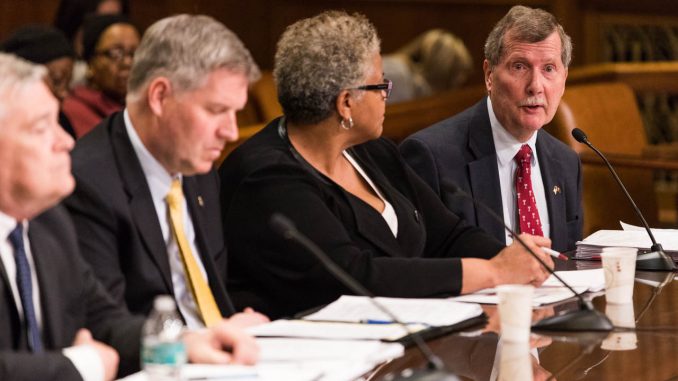
HARRISBURG — President Richard Englert joined other leaders of Pennsylvania’s state-related universities on Tuesday morning in Harrisburg to advocate for next year’s state funding levels. Englert asked the state for $172.9 million.*
Each year, the presidents of Temple, University of Pittsburgh, Penn State and Lincoln University testify in front of the state’s 26-member Senate Appropriations Committee.
I’m here in Harrisburg for the testimony from presidents of state-related PA universities to ask for more appropriations
— Julie Christie (@ChristieJules) February 27, 2018
Sen. Patrick Browne, the chair of the committee, told the presidents that Harrisburg’s attitude toward state appropriations is changing, but each university should expect a third year of flat funding, totaling $150 million for Temple. This state appropriation by Gov. Tom Wolf makes up a little more than 10 percent of the university’s total budget.
The university’s annual costs rise each year and overrun the flat funding, which is $30 million less than Temple’s highest appropriation in 2008.
“Sadly, we’re happy with it,” said Ken Kaiser, Temple’s chief financial officer and treasurer. “But we’re really losing ground as prices go up.”
Kaiser added that the appropriation won’t prevent a tuition increase, but the university will still be able to “keep tuition affordable.”
“The appropriation we receive at Temple University is critical to our ability to provide a discount in tuition for Pennsylvania residents,” Englert told The Temple News after the hearing. “We keep tuition, our sticker price, as low as we can.”
According to the 2017-18 Temple University Fact Book, the average tuition cost for full-time, in-state undergraduate students was $16,658. The appropriation makes a nearly $12,000 difference in out-of-state and in-state students’ tuition. Out-of-state students average tuition costs totaled $28,418 for this academic year.
Temple is still recovering from severe state budget cuts in 2011. In 2015, it wasn’t clear whether Temple would receive any state funding.
Funding wasn’t the only topic discussed at the hearing. Sen. Sharif Street, whose constituency includes Temple and the area near Main Campus, asked how each university gave back to their surrounding communities.
Englert was unable to provide an answer to the committee before the time for responses expired. He told The Temple News afterward that university initiatives — like the 20/20 scholarship program, which annually awards 25 local high school students with $5,000 scholarships — benefit North Philadelphia.
Englert added that the university is working to address consistent community concerns like trash, which Street brought up during Tuesday’s hearing. He said Temple is trying to get the city to pick up trash in the area near Main Campus more frequently.
“[Temple’s relationship with the community] requires some work,” Street told The Temple News after the hearing. “It’s sort of almost been schizophrenic because from a perspective of educating people, it’s been positive. … In terms of its relationship to the community and quality-of-life issues, it has always had challenges.”
Jackie Wiggins and Ruth Birchett, who are both community residents and members of the Stadium Stompers — an organization made up of students and residents who oppose Temple’s proposed on-campus football stadium — attended the hearing.
“We’re here because our neighbors sent us here to listen and be sure that this government and the Commonwealth of Pennsylvania does not give this institution a dime to disrupt our community,” Wiggins said.
But Street said he’s hopeful relations between Temple and the North Philadelphia community will improve.
“There’s a greater dialogue now than there has been historically,” Street added. “I say this as a person who’s lived in the community for years. And even though that has improved, it certainly has a ways to go.”
The state House and Senate will review and adjust Wolf’s executive budget for a vote by July 1. It will go into effect with or without the governor’s signature by July 11.
“I’m cautiously optimistic that we will get flat funding,” Englert said. “But every year, it’s always important that the Commonwealth be able to see what it is that higher education does.”
Sydney Schaefer contributed reporting.
*UPDATE: This story has been edited to reflect the most recent information.



I do not want Temple University to receive a dime of money from the Commonwealth of Pennsylvania for building a football stadium in North Philadelphia residential community. Perhaps Temple Board of Trustees and President Englert can explain their need for taxpayer funds while they could instead utilize the $140 million intended for its proposed, non-essential, 35,000-seat football stadium to account for the academic funding they are seeking from state taxpayers.